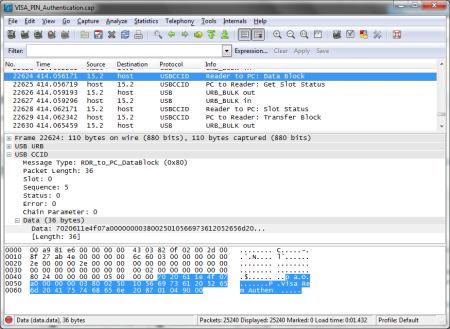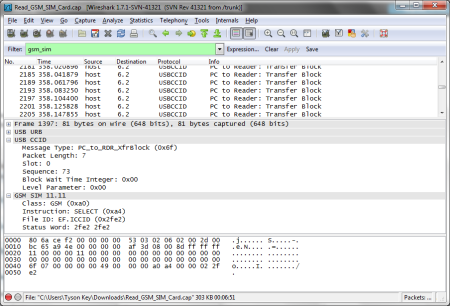As I mentioned in my previous post, I’ve been working on improving support for dissecting smartcards-related protocols in Wireshark, and delivered preliminary support for the USB CCID specification in November 2011.
Since then, I decided to implement support for switching the protocol used for dissection of payloads sent from the PC to the card reader using Wireshark’s preferences mechanism, after reading the source code for the I2C dissector.
This functionality was accepted upstream in SVN revisions 41151 and 41156, and consisted of two patches – one of which implemented it in a hackish manner, and the other served to clean things up in the hopes of making the code more readable and maintainable.
Prior to implementing this, I decided to conservatively treat data flowing to and from a card and reader in a generic manner, since users are likely to use a diverse range of standardised and proprietary protocols – the result of which looked like:
Now, right-clicking on the “USB CCID” row of the protocol tree reveals a “Protocol Preferences” submenu, which contains another one entitled “PC -> Reader Payload Type“:
As you can probably tell, I’ve retained the generic dissection support, in addition to providing the option of dissecting payloads using the dissector for the GSM SIM profile of the ISO/IEC 7816 contact smartcard standard, as developed by the Osmocom SIMTrace project.
Upon activating the SIM dissector, PC_to_RDR_XfrBlock (0x6f) packet payloads should be dissected in a slightly more useful manner:
Obviously, there are still some outstanding bugs that I’m aware of (the CCID dissector’s info column text overrides that of the selected dissector, and the GSM SIM dissector itself doesn’t cope with packets without status words well, at present), although I aim to resolve those in time – along with adding support for new payload protocols.
In the meantime, I hope that others will find this enhancement useful.



